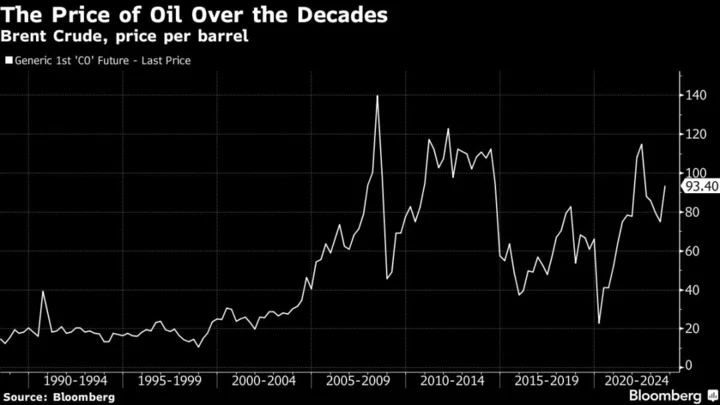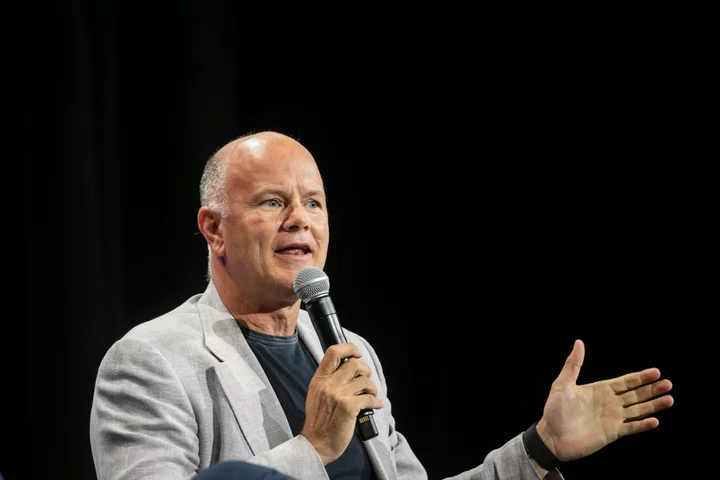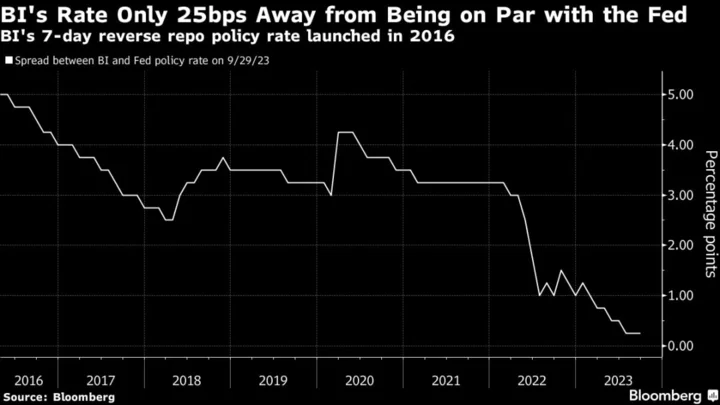A hedge fund manager who made a name for himself shorting fossil fuel stocks says the strategy is no longer viable, as oil’s ascent proves too strong to fight.
James Jampel, the founder of Massachusetts-based HITE Hedge Asset Management, said he still believes oil will lose steam in the longer term. But thanks in large part to the geopolitics of oil, that moment is further away than he once imagined and shorting fossil fuel producers has become untenable, he said.
“That strategy was blown up by Putin,” Jampel said in an interview, referring to the war in Ukraine started by Russian President Vladimir Putin, and the energy crisis it triggered. Shorting oil stocks is now “too volatile” an exercise “to be viable at this time,” he said.
It’s the latest sign that investors are recalibrating as oil flirts with $100 a barrel, while green stocks get pummeled by a combination of higher borrowing costs and supply-chain bottlenecks. Sectors that were supposed to benefit from climate subsidies, such as solar and wind, are now being shorted by a number of hedge funds. Meanwhile, oil majors are doubling down on plans to expand their core business.
Read More: OPEC Is Exceptionally Bullish on Oil Up to End of 2024: BNEF
Jampel said he shuttered the HITE Carbon Offset fund last year, after using it as a vehicle to bet against fossil fuel stocks since 2018, and hasn’t seen any openings to reinstate the strategy since. Losses in connection with the closing were “minimal,” he said, because the strategy had yielded “so much in the early years.”
After returning almost 30% in 2020, the strategy started losing money in 2021, which the hedge fund manager initially thought would end up being “the biggest dead-cat bounce in history.”
He said he still thinks fossil fuel securities will underperform the market in the long run. “But getting the timing right is very difficult.”
Jampel, who oversees about $830 million, said the only strategy he currently pursues is energy-market neutral, meaning he’s not betting on gains or declines in fossil fuels versus new energy stocks.
Over the past 12 months, an investor in Exxon Mobil Corp. has seen a stock price increase of close to 30%. A shareholder in Vestas Wind Systems A/S, meanwhile, has hardly seen any change in value. Orsted A/S, the world’s largest developer of offshore wind farms, is down more than 40% in the same period.
Those performances are reflected in broader indexes, with the S&P Global Oil Index up about 14% in the past year, compared with a 28% slump in the S&P Global Clean Energy Index. Even clean energy proponents are warning of years of pain when they look at sectors like wind.
Oil’s proponents are feeling emboldened. This week, producers attending the World Petroleum Congress were united in their criticism of the International Energy Agency and what they characterized as its politicization of the climate debate. That’s as the IEA issues warnings that there’s no room for developing new oil fields if the planet is to have any chance of limiting global heating to the critical threshold of 1.5C.
Such predictions have been underscored by the spike in extreme weather events, as continued increases in greenhouse gas emissions coincide with record heat waves, droughts, flash floods and wildfires across huge swathes of the planet. United Nations Secretary-General Antonio Guterres declared in July that “the era of global boiling has arrived,” as efforts to curb reliance on fossil fuels fall well short.
The IEA says there’s a possibility that oil demand may plateau this decade as households rely increasingly on renewable energy sources. It also says that in order to achieve net zero emissions by 2050, oil demand needs to sink to about 25 million barrels a day by the middle of this century, which is one-fourth the current level.
But such forecasts have yet to be reflected in oil prices, as investors focus on short-term dynamics such as cuts by oil-producing nations that coordinate their actions through OPEC, Jampel said. Bloomberg Intelligence estimated this month that the delivery of output cuts by OPEC+, which is a wider collection of petro-states that includes Russia, may help push the price of Brent crude to $100 a barrel.
Read More: Goldman Sachs Says Oil’s Going Back to $100 as OPEC+ Cuts
“The energy transition is only going to make energy prices more unstable,” Jampel said. The outlook for oil consumption will become “less clear,” which will “lead to greater volatility and greater mispricing opportunities,” he said.
Jampel expects that subsidies being injected into the green economy via the Biden administration’s Inflation Reduction Act will make it increasingly hard to maintain long bets on fossil fuels. The IRA “has accelerated the trend away from fossil fuels and towards new energy,” he said.
Still, HITE won’t bet that oil stocks will “underperform or overperform clean energy because that is too risky and too difficult to make in the short run.”
“However, we do believe that the energy transition is real and accelerating,” Jampel said. “Over time, the better opportunities are going to be in new energy than in fossil energy. Although predicting that, in the short or even medium run, is extremely difficult.”
(Adds reference to wind sector bets in 10th paragraph.)









